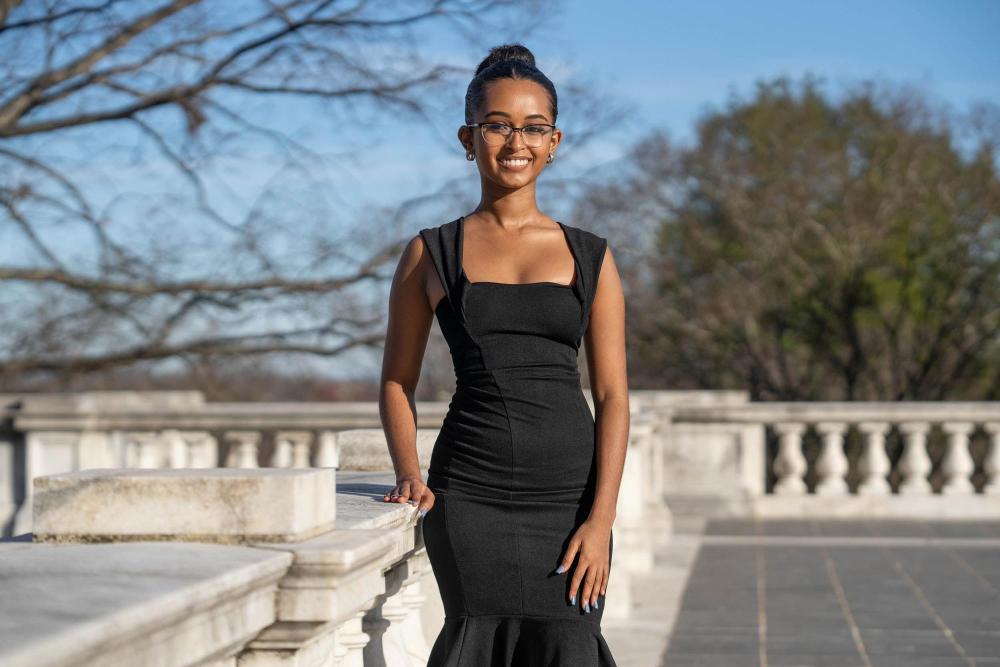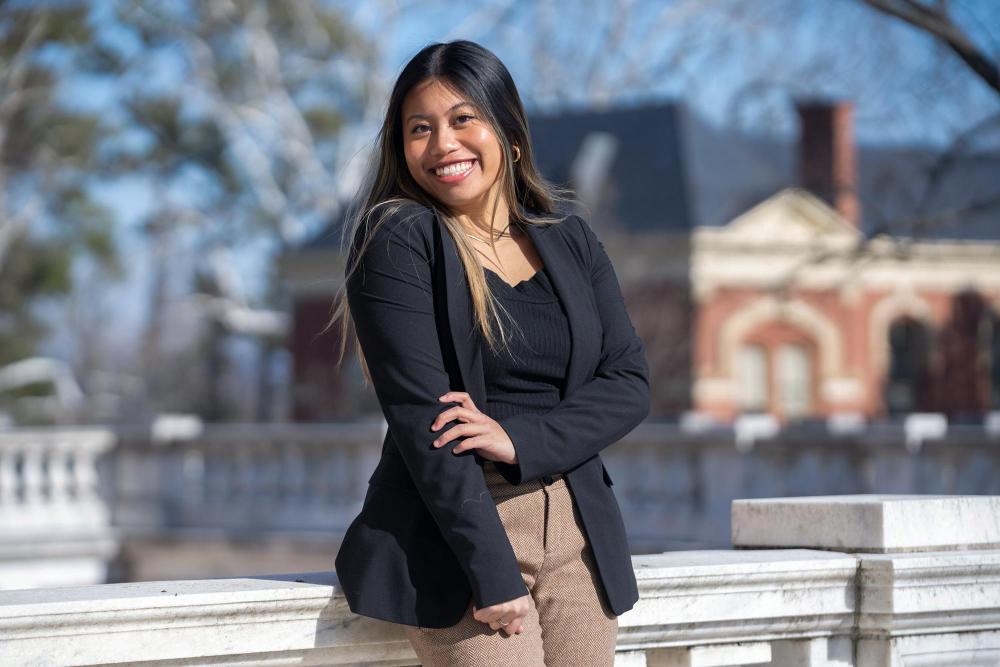Payne Fellowship Opens Diplomatic Career Path for 2 UVA Fourth-Year Students

Two graduating students, Abeba Amenshowa and Leigh Mante, are en route from the University of Virginia to diplomatic careers as Payne Fellows.
Sponsored by the United States Agency for International Development, the Donald M. Payne International Development Graduate Fellowship Program seeks students who want to pursue foreign service careers in USAID. The fellowship provides up to $104,000 in benefits over two years for graduate school, internships and professional development activities. The fellowship is named after the late U.S. Rep. Donald M. Payne of New Jersey.
Abeba Amenshowa
Amenshowa, a native of Ethiopia living in Ashburn, is majoring in both global development studies and foreign affairs. She is now applying to graduate schools, seeking a master’s degree in international development with a concentration on global public health.
“My dream is to work in the global health sector of the USAID,” she said. “I will enter the Foreign Service as a health officer with the aim of creating strong and resilient health systems on a global scale that can then lead to sustained positive health outcomes.”
Amenshowa said her personal experience will help guide her in diplomacy.
“As an immigrant from Ethiopia, I have seen how developing countries lack the proper systems to support the millions struggling with their health,” she said. “Witnessing tragedies at both the national and personal level showcased the high costs of non-cooperation in response to global health issues. I applied to the Payne Fellowship because it was the perfect opportunity for me to gain hands-on experience that interconnects with my passion for global public health and diplomacy, and serving others, and helps to strengthen my academic knowledge to support a career as a foreign service officer within USAID.”

(Photo: Sanjay Suchak / University Communications)
Amenshowa credits her perseverance in attaining a fellowship.
“Although it’s easy to get discouraged when things don’t go according to plan, when you’re passionate about something, you do not give up easily,” she said. “In my case, it wasn’t the first or second fellowship I applied to that accepted me, but the third. Receiving those rejections did make me doubt myself at points, but I had to remind myself that every new application is another chance getting closer to my dream.”
Amenshowa interned at UVA’s Maxine Platzer Lynn Women’s Center for the past two years and is currently a senior intern for the center’s “Speaking in Hues” podcast, which amplifies the stories of women of color within UVA, Charlottesville and beyond.
“Abeba Amenshowa is a phenomenal person and an extremely dedicated worker,” said Genevieve Brackins, an education and outreach specialist at the women’s center. “Among the many wonderful aspects to celebrate about Abeba, I enjoy our conversations the most, discussing everything from life to society and everything in between. She is a joy to know. It is my sincere belief she will be such an asset to the USAID Foreign Service.”
Amenshowa is on the student advisory board for the Center for Global Health Equity, which promotes interdisciplinary discussion of global health in the University and Charlottesville community, and is a member of the Residents for Respectful Research team at Charlottesville’s Public Housing Association of Residents, which apprises residents of public housing-related research.
She has also been involved with Health Bridge, acting as a liaison between clinical staff, patients and local organizations.
“Abeba is a diligent student in class, ready to make sharp comments on complex matters, especially those at the confluence of health and politics,” said David Edmunds, an associate professor in the global studies program. “In the more than two years I’ve known her, she has grown in confidence and is now quite ready to take control of her own learning.”
Amenshowa is a Rainey Academic Scholar and a Beth Garrett Memorial Grant recipient. She was a finalist for the Questbridge and Charles B. Rangel programs.
“As a first-generation student, I wouldn’t have had the experience I did at UVA without the resources available to me,” Amenshowa said.
Leigh Mante
A fourth-year student majoring in global public health and mathematical statistics, and minoring in global sustainability, Leigh Mante is on the verge of fulfilling a dream.
“I have wanted to pursue a career in international development since the summer after my first year of college, when I returned to the Philippines as a food security and nutrition intern with the International Institute of Rural Reconstruction,” Mante said. “I hope to continue on this trajectory and remain within the foreign service.”
Mante said she plans to seek a graduate degree in international development and is applying to graduate schools in New York City and Washington, D.C.
“After I graduate this May, I will participate in a Payne Fellow orientation program in Washington, intern on Capitol Hill for 10 weeks, and then begin graduate school in August,” she said. “Between my first and second year of graduate school, I will participate in a 10-week internship at a USAID post overseas. After graduate school, I will be appointed as a foreign service officer on a five-year contract with USAID.”
Mante plans to use the Payne Fellowship to broaden her skill set.

(Photo: Sanjay Suchak / University Communications)
“During graduate school, I intend to bridge my knowledge gaps in economics and political science, while continuing to apply my existing quantitative skills to development issues through monitoring and evaluation courses,” Mante said. “Ultimately, I hope to develop a versatile skill set with a strong theoretical foundation and advanced technical expertise in order to be prepared to invoke positive change as a foreign service officer.”
Born in Tagbilaran City, Bohol, Philippines, Mante moved to Virginia Beach with her family when she was 3 years old. As a college student, she spent a summer interning at the International Institute for Rural Reconstruction in Cavite, Philippines, where, with one other student, she reviewed the institute’s work in health and nutrition and compared it with other programs in Southeast Asia.
“It was also my first time visiting my birth country in years, so I was very grateful for the opportunity to learn from the farmers and learn more about my heritage,” Mante said. “This experience also expanded my interest beyond public health to broader, interdisciplinary issues in development, such as the environment and education.”
As a student at Princess Anne High School in Virginia Beach, she studied in the International Baccalaureate diploma program and served as a student educator on a medical mission in Santa Cruz, Bolivia, with Operation Smile, a global organization seeking to increase access to safe surgical care. The experience brought out her passion for international work, she said.
“Reflecting upon the short-term nature of these medical missions, I became interested in understanding how to establish long-term solutions to issues relating to health equity and health access,” Mante said. “Although my interests in development began in global public health, I have been lucky enough to work on projects in undergrad relating to environmental justice, educational access and gender equity.”
Mante was an undergraduate research assistant for two years at UVA and an enterprise support systems intern for SEWA Bharat, which supports women in India working in an informal economy. Mante also works at the U.S. Environmental Protection Agency in the Office of Chemical Safety and Pollution Prevention’s Data Gathering and Analysis Division. She coded a methodology that identifies U.S. communities that are disproportionately exposed to toxic chemicals.
Her work with the International Institute of Rural Reconstruction impressed her mentor.
“She worked in an office for much of the summer, reviewing documents much of the day, and was diligent and effective in this work,” said David Edmunds, an associate professor in the global studies program who mentored Mante in two global research projects. “However, she really flourished during the short field trips to communities that were undertaking nutrition-inspired farming. She was attentive as farmers spoke, asking good questions and making links to the cases she had read earlier in the summer from other locations.
“I especially enjoyed Leigh’s clear expressions of wonder and appreciation at how things worked on the farms, and I believe the farmers did, too.”
Mante received the 2020 Hannah Graham Memorial Award, given to a student promoting health and development. Though she was unable to travel due to the pandemic, she was subsequently awarded a Center for Global Health Equity Award in 2021 as part of a team of student researchers working on a virtual project supporting youth-led community-building and health activism in Khayelitsha, Cape Town, South Africa.
“Beyond the foreign service, I would hope to continue a career in international development either as a monitoring, evaluation and learning specialist or global health policy analyst,” she said.
A Shared Start
Both Mante and Amenshowa started research at UVA through the Undergraduate Student Opportunities in Academic Research program, which provides qualifying students with paid research work.
Amenshowa worked on three different projects in three different fields in USOAR. She worked in a social psychology lab examining if social distance, in conjunction with gender, affected colorism, which is prejudice or discrimination against individuals with a darker skin tone. Then, she researched what role forgiveness plays among the differing groups in the Rwanda genocide. And in her third project, she worked with Charlottesville’s Public Housing Association of Residents to educate and empower low-income residents to protect and improve their own communities through collective action.
“Although I did work in three different areas, in addition to gaining qualitative and quantitative research experience, all three experiences allowed me to foster critical thinking and analytical skills through hands-on learning, as well as better define my academic, career and personal interests,” she said.
“We’re very proud of Abeba and Leigh,” said Andrus G. Ashoo, director of the Office of Citizen Scholar Development, who oversees the USOAR program. “Through the program, we have a number of additional goals we want to achieve as we support these students in participating in research projects. One of them toward the end of the first year is to try and pique the curiosity and interest of the students so that they will explore other opportunities for their development and feel empowered to pursue them.”
Mante started USOAR with work in a systems engineering laboratory within a team of fourth-year capstone students and psychology graduate students to design a more tailored interface for MindTrails, a mobile health sensing application seeking to help reduce anxiety. In her second year in USOAR, Mante switched labs to work under sociology professor Natalie Aviles on a project examining innovation in the biomedical research economy using reports from the National Cancer Institute.
“I wanted to gain additional exposure to the public health field and gain data management experience,” she said. “The USOAR program was very valuable in allowing me to explore and hone in on my specific academic interests. Through USOAR, I was able to expand my professional network, as well as receive mentoring and early exposure to opportunities such as the Payne Fellowship.”
“I’m always sowing seeds with the USOAR students – it is a thrill when one takes. That Leigh found out about the Payne through my class in her first year of USOAR is a real treat,” said Ashoo. “Abeba and Leigh are excellent examples of curiosity and exploration through hard work, and I am sure other students will now explore fellowships like the Payne because of them.”




